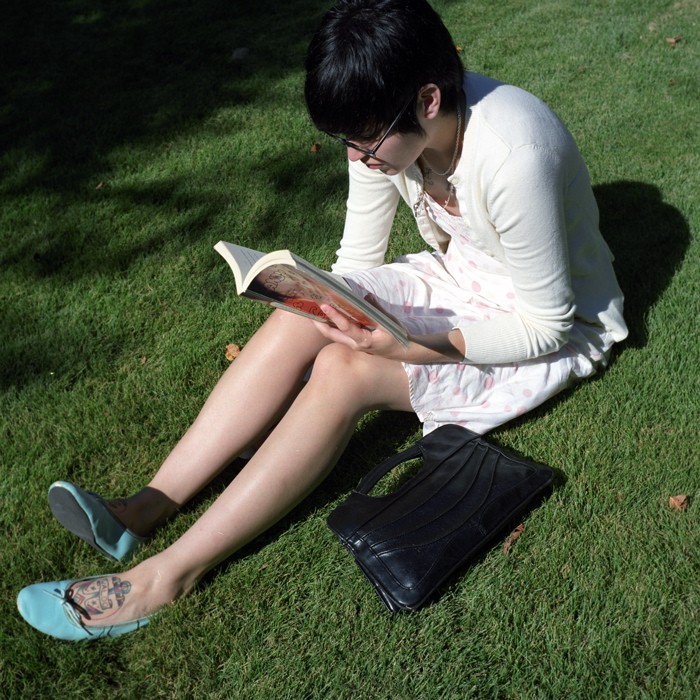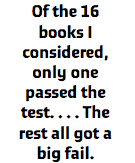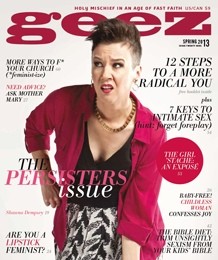Where are all the girls in children’s Bibles?: An excerpt

Credit: Lee Summers, http://www.flickr.com/photos/thisisawakeupcall/274938225/in/photostream/
“Did you know, Mom, that it pleases God to read your Bible every day?”
I’m sitting with my children, eating breakfast at the dining-room table, which is strewn with the picture Bibles I plan to review for Geez. My 5-year-old asks this question as he sits with a copy of The Jesus Storybook Bible open to illustrator Jago’s fascinating aerial view of Jericho, with Joshua’s army marching round and round. Pencil in hand, he’s trying to copy the drawing.
“Hmm . . . yes, that’s what some people believe,” I respond. This is my cover-all response for ideas about religion that come from family members, or sometimes Sunday School. “Where did you hear that?” I add, trying not to sound shrill.
I’m a feminist Christian with a long-standing discomfort with the Bible. Regular Scripture reading is not part of our family life. Sometimes, I wonder if I should be doing more to teach my children about the Bible. Is it okay to leave it to trusted Sunday School teachers and camp counsellors to impart the stories of our faith tradition to my children? If they don’t read their Bible every day, will they “shrink, shrink, shrink” like it says in a song I learned as a child?
Not satisfied with the children’s Bible I grew up with, nor even the newfangled one my son is perusing (which I have to edit for patriarchal content as I go along), I’ve long wanted to find a feminist Bible I can read with my children. This is my chance.
 I began optimistically, searching the Mennonite Church Canada and Quaker Books websites for children’s Bibles that might satisfy a feminist consciousness, then combing the shelves of my local Christian bookstore for anything I might have missed. I added The New Bible in Pictures for Little Eyes because it’s a classic (my classic) and The Beginner’s Bible because it’s a bestseller. The review copies arrived in the mail over the winter holidays, 16 books in all.
I began optimistically, searching the Mennonite Church Canada and Quaker Books websites for children’s Bibles that might satisfy a feminist consciousness, then combing the shelves of my local Christian bookstore for anything I might have missed. I added The New Bible in Pictures for Little Eyes because it’s a classic (my classic) and The Beginner’s Bible because it’s a bestseller. The review copies arrived in the mail over the winter holidays, 16 books in all.
As I read through the stories, I slipped in and out of nostalgia and an angry awareness that these texts are tools of oppression – sexist oppression, and racist, classist, heterosexist, ableist. Sometimes I have to double back and reread a story: How did I miss the gender pronoun for God the first time? How did I not notice the unquestioning endorsement of military might and the domination of one group over another?
These stories were the daily bread of my childhood. They invite me to turn off my critical mind and let the familiar myths and cadences take over; they invite me to forgive their failings as feminist literature and simply enjoy the love of old stories. It’s not easy to stay aware of the oppressive power of the stories that are the building blocks of my understanding of the world.
I also don’t know how to read the Bible as a feminist. My favourite feminist foremothers have taught me that “the master’s tools will never dismantle the master’s house” (Audre Lorde) and “this is the oppressor’s language // yet I need it to talk to you” (Adrienne Rich). They’ve taught me that if religion offers you a male god to worship and threatens your very personhood, you walk away. Yet here I am, still in the Christian fold, tool-less and sometimes lost.
So, for the purpose of this review, I’ve created my own tool, a five-finger test for feminist picture Bibles (see side- bar). Of the 16 books I considered, only one passed the test, and I’m not sure it even counts as a picture Bible. The rest all got a big fail.
This is my assessment of what I read, with bonus insights from feminist theology along the way.
This is an excerpt from the article Where are all the girls in children’s Bibles? by Geez editor Melanie Dennis Unrau. The rest of the article can be found in the print copy of the Spring 2013 issue of Geez: The PerSisters Issue.
Melanie Dennis Unrau lives in Winnipeg, Manitoba. Send her your thoughts on this or any other story in Geez. You can write to her at melanie [at] geezmagazine [dot] org. With research assistance from Carly Ciufo.
1 Comment
Sorry, comments are closed.



I have a tough time understanding and accepting the patriarchal society. But I’ve learned to understand why feminism is so big in North America – capitalism and patriarchism (have absolutely no clue how that word bends and is used…) sort of feed that. See, the culture I grew up in and learned Bible in, includes women. I’m not saying it’s perfect in any way, but in my experience, there was never a need to fight for your rights based on your gender. That’s a definite power of a matriarchal society and home And I believe women have the power in our hands to change the direction here too – we do have a lot of power over what and how we teach our and other people’s kids, what our families do and how they function…
See, for some reason it was always clear to me that from Eve to Jochebed and Miriam to Rahab to Naomi to Mary and Mary Magdalene and the rest of the women in between and after these, were significant characters in the human history and in God’s eyes (I have no perception how these things were initially taught to me – maybe it’s partly just the notion of always adding “and all the women and kids” when the Bible talks about how many men this and that… And partly having personally known so many strong spiritual female leaders and reading bibliographies of more of those. I do know however that, it was part of teaching plan when I was a kid, to go through the characters and deeds of the heroines just as well as the heroes, and the significance of the female followers of Jesus just as much as Peter and John).
So I think it’s through reading the whole Bible, it teaches us the balance between the genders. I think women realising their place in God’s kingdom and fulfilling (please note I’m not saying claiming!) it, we are fulfilling the purpose God created us for. We are important, powerful and heroic. I think it’s a huge loss in this culture that women have let men oppress them and continue to do so. We are different, but we are nonetheless equal. I think the Bible is pretty clear on that – if you read the whole thing and not just selected verses and laws etc. To me, it’s clear that if a kids’ bible or any other version fails to communicate this, it’s better to move on to a version that does include the whole picture. That’s why at least in our house, many versions are read and each story discussed. The fact that the boys are in a developmental stage of being stuck in David and Goliath? Well, some evenings they don’t get to choose which page we read!
Another, somewhat unrelated thing I’m annoyed about, is that there are no stickers or trading cards for Bible heroes… How is this possible in this day and age?!
a April 9th, 2013 4:21am